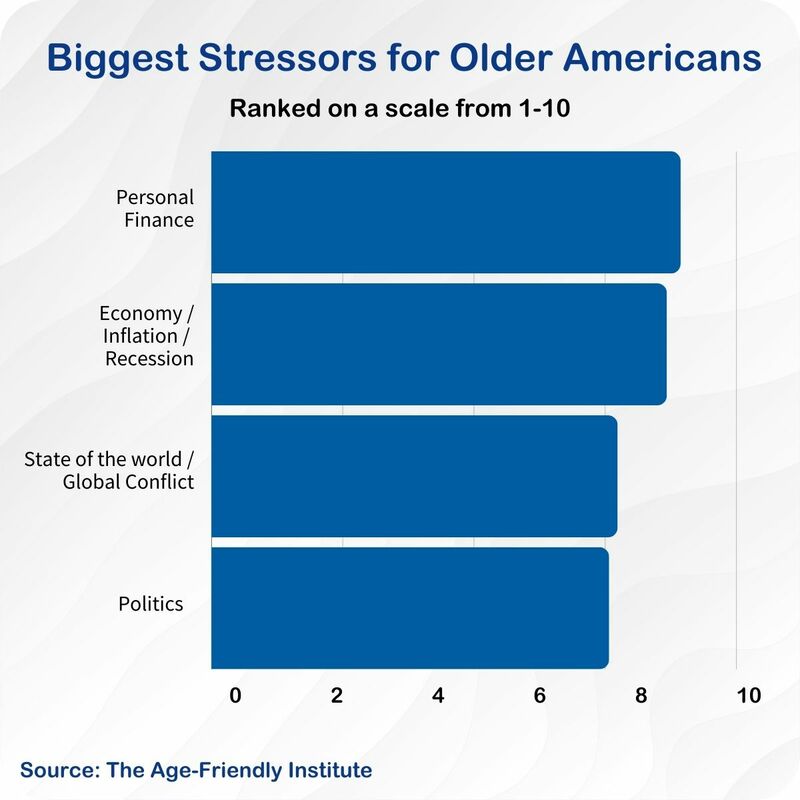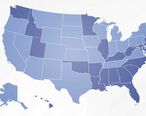Aging and Anxiety: Unraveling the Stressors Affecting Older Americans
Older Americans face unique challenges that lead to increased stress, which can significantly impact their health. We surveyed the Age-Friendly Institute audience to understand their stress levels and coping mechanisms.

Top Stressors:
- Finances and Economy: Financial concerns ranked highest with a stress level of 7.2 out of 10, followed by worries about the economy at 6.9. Many older adults struggle with retirement savings, healthcare costs, and supporting family members financially.
- Global Conflict and Politics: Increasing global conflicts and political instability caused stress levels of 6.2 and 6.1, respectively. The constant stream of political news and social media debates adds to the stress.
- Health Issues: Health-related stress, including chronic conditions and aging, scored 5.7. Concerns about cognitive decline and maintaining independence are significant stressors.
- Employment Concerns: Job loss or potential job loss, also at 5.7, ties back to financial worries.
Changing Times: Many survey participants noted that life today feels more stressful than in the past. Factors include a faster pace of life, internet overuse, economic instability, global conflicts, increased violence, and societal changes.

| Stress Factor | Impact Level |
|---|---|
| Personal Finances | 7.15 |
| Economy / Inflation / Recession | 6.94 |
| State of the world / Global conflict | 6.19 |
| Politics | 6.06 |
| Health Issues | 5.67 |
| Loss of work | 5.67 |
| Crime / Violence | 5.55 |
| Family issues / Caregiving responsibilities | 4.78 |
| Major life changes | 4.63 |
| Job satisfaction | 4.63 |
| Loneliness or boredom | 4.59 |
| Loss of a loved one / Divorce | 3.90 |
Coping Strategies:
- Meditation/Prayer: 62% of participants meditate or pray to manage stress.
- Joyful Activities: 57% engage in activities that bring them joy.
- Exercise: 49% use exercise to relieve stress.
- Social Connections: 48% talk to friends and loved ones.
- Sleep: 46% prioritize sleep.
- Addressing Stressors Directly: 42% remove the source of stress or deal with issues head-on.
Resources for Help:
- Internet: 46% use online resources for guidance.
- Religious Resources: 37% turn to their faith.
- Community Resources: 20% seek help from community services.
Effective Stress Management:
- Physical Exercise: Regular exercise promotes endorphin release and overall well-being.
- Social Engagement: Joining clubs, volunteering, and participating in community activities combats loneliness and boosts mood.
- Relaxation Techniques: Meditation, deep breathing, and progressive muscle relaxation help reduce anxiety.
- Support Networks: Talking to friends, family, or counselors provides emotional support. Support groups offer valuable insights and companionship.
- Healthy Lifestyle: A balanced diet, adequate sleep, and avoiding excessive alcohol or tobacco use are crucial for physical and mental health.
Most of us think that life will be carefree in retirement but for our survey participants who were either fully or partially retired 69% say they don’t feel as much of a reduction in stress as they thought they would.
Studies show that older Americans experience more stress than their parents did at the same age. We asked our participants for their thoughts on why and this is what we heard.
Way of life, a faster pace. The effects of the Internet when we spend too much time on it. The economy. Threats of war. Increase in violence. Decline in morals, freedom of speech and freedom of religion. Increase of divorce and division in families.
My parents lived through the Depression, but were kids and teenagers then. They worked steady jobs and could raise a family on one salary. Now, jobs come and go, people do not seem that emotionally stable to handle life's hard choices.
Our financial situation is so volatile, we really have no control over how much things cost nowadays. There's no way to realistically plan for our future when prices on everything keeps going up and our income stays the same.
Through education, social engagement, physical activity, and seeking appropriate support, older Americans can navigate these challenges with resilience and maintain a positive outlook. With the right tools and support systems in place vitality, connection, and fulfillment does not need to be based on age.














My highest priority is safety. I live alone and it is increasingly difficult to do so without the uninvited notice of others. It becomes problematic when nosey neighbors feel it’s simply ok to micromanage my time, political perspective and events. This type of intrusive conduct has added a layer of stress to my life I simply despise. I raised my children alone after a divorce and I am at a point in my life where I desire rest and privacy.